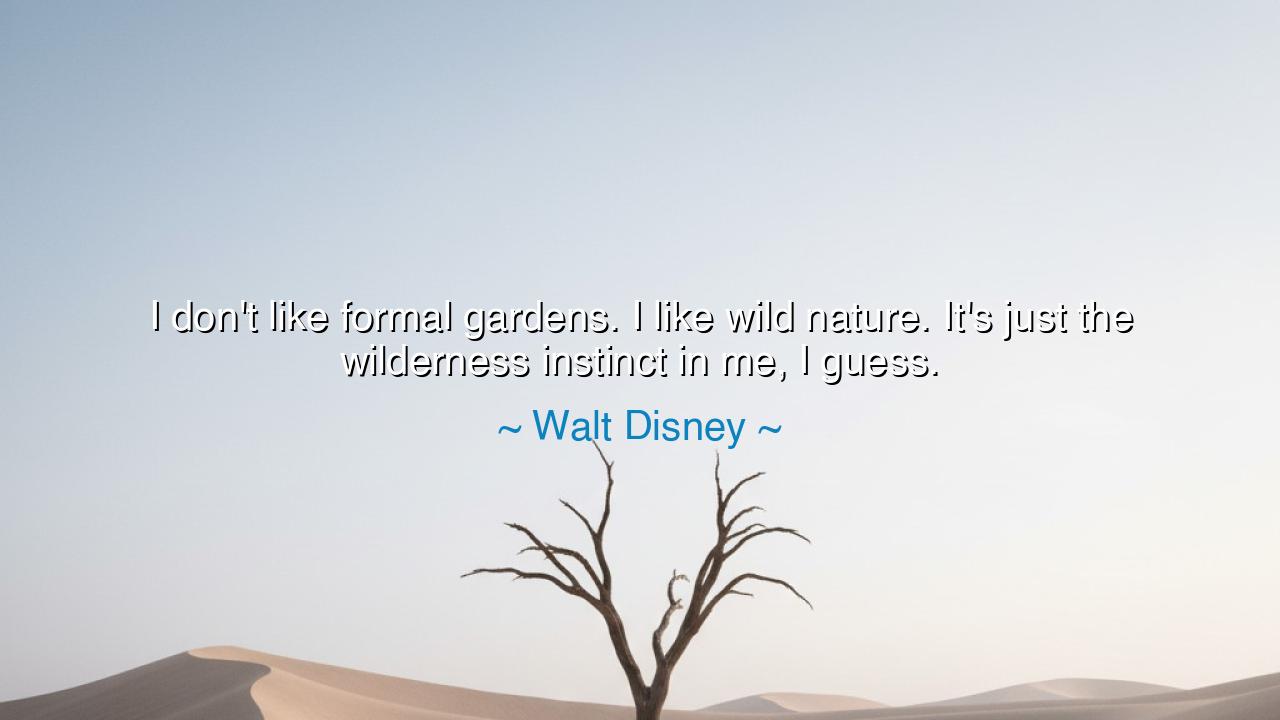
I don't like formal gardens. I like wild nature. It's just the
I don't like formal gardens. I like wild nature. It's just the wilderness instinct in me, I guess.






In the vast symphony of existence, there are those who find themselves drawn not to the cultivated and neatly ordered rows of the world, but to the wild and untamed beauty that arises from nature itself. The words of Walt Disney, "I don't like formal gardens. I like wild nature. It's just the wilderness instinct in me, I guess," speak to a deep and primal part of the human spirit, a part that yearns for freedom, for chaos, and for the untamed forces that shape the world. These words reveal a truth that has been held in the hearts of many before us: there is something sacred in the wild, in the unruly beauty of nature, and in the instinct that drives us to embrace it.
A formal garden, with its rigid lines and perfect symmetry, may appear beautiful to the eyes, yet it is born from human order—from the desire to control and mold nature to fit a particular vision. But the wild, untamed places—the forests, the mountains, the open plains—are born of something far greater. They are the product of chaos, of forces beyond human control, and yet, in their very disorder, they possess a beauty that the mind can scarcely comprehend. Disney knew, as many of the ancient philosophers did, that there is a profound connection between the wildness of the world and the deepest aspects of the human soul. There is a part of us that longs to be connected to the wilderness, to the world before civilization imposed its rules upon it.
This yearning for the wild is not new; it has existed for as long as humanity has walked the earth. Consider the ancient Celts, who revered the untamed forces of nature. They understood that in the forest, in the storm, in the mountains, there was a power that could not be tamed, a power that connected them to the earth in a way that the ordered cities could not. Their gods were often wild—spirits of the forest, of the wind, of the river. To them, the wilderness was sacred, a place where the divine could be felt in its purest, most untethered form.
Yet, this call of the wild is not merely a desire to escape the comforts of civilization, but a return to something more authentic, a return to the truth of the earth itself. The wild places of the world do not hide their imperfections; they do not try to present an idealized version of existence. Instead, they are honest, raw, and full of life. It is in the wilderness that one can experience the truth of being, where the rhythms of nature are felt deeply and where human lives seem but small sparks in the vastness of the world. The wisdom of Walt Disney echoes the timeless understanding that there is an instinct in each of us to seek that authenticity, to feel the power of the earth in its most primal form.
This wisdom is embodied in the life of John Muir, the great naturalist, who devoted his life to preserving the wild places of America. Muir saw in the wilderness not a place to escape to, but a place to truly live—a place where the human spirit could be renewed by the raw energy of nature. He spoke of the wilderness as a sanctuary for the soul, where one could reconnect with the truth of existence. Like Disney, Muir felt an almost spiritual connection to the untamed world, a connection that nourished his creativity and his sense of purpose. Muir’s work in establishing the national parks was not just a fight for land, but a fight for the preservation of the wild—the preservation of the natural world that he knew was essential to the well-being of humanity itself.
And so, let us reflect on the deeper meaning of Disney’s words and the wisdom of those who have walked the path before us. There is a powerful instinct in the human heart to return to nature in its purest form, to find in the wilderness something more than what civilization can offer. The lesson is clear: we must not lose sight of this wildness within ourselves. We must seek out the untamed places, the chaos, the wild beauty that reminds us of our own primal nature. It is through embracing the wilderness, both in the world around us and within our own hearts, that we can reconnect to the truth of our being.
Practical action lies in seeking balance. While civilization brings comfort and structure, let us not forget the need to step outside the walls we build around ourselves. Walk into the forests, the mountains, the open plains. Feel the wind on your face, the roughness of the land beneath your feet, the untamed beauty of the world in its natural state. And, in doing so, remember that the wild is not something to be feared, but something to be cherished. It is the wilderness instinct in each of us that connects us to the earth, to life, and to the very heart of what it means to be truly alive.






AAdministratorAdministrator
Welcome, honored guests. Please leave a comment, we will respond soon